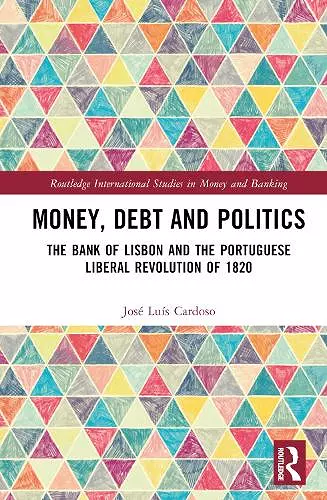Money, Debt and Politics
The Bank of Lisbon and the Portuguese Liberal Revolution of 1820
Format:Hardback
Publisher:Taylor & Francis Ltd
Published:30th Dec '22
Currently unavailable, and unfortunately no date known when it will be back

This book presents an innovative history of the first Portuguese public bank, by exploring the relationship between banking activities and the political context. It provides an overview of the origins of the banking system in Portugal, and also in Brazil, and explores new archive materials related to the first years of activity of the Bank of Lisbon and to the public debates on monetary and public finance topics.
It discusses the main features of the Bank of Lisbon: a private bank with a mandate to issue banknotes for the purposes of regulating monetary circulation, and with the function of financing the State for current payments, as well as for the amortisation of public debt and the creation of new debt. The aim of contributing to the re-establishment of public trust and credit conferred upon the Bank of Lisbon the status of a quasi-central bank with the obligations of lending and issuing money.
This historical case study offers new insights for a better understanding of the role of banks on the regulation of monetary circulation and on the management of sovereign debt. By stressing the relevance of the political context, it also illustrates the key issues of trust, independence and rules associated to decision-making processes in the study of European banking history.
The main focus is the link between banking practices and the political environment. However, the reader will also engage in discussions on theoretical and economic policy issues on the main economic topics under survey: money, paper money, public debt and credit system.
Using a wide range of fascinating archival sources, José Luís Cardoso, in the History of the Bank of Lisbon, has opened up new vistas on the early development of central banking in Portugal showing the importance of the institutional and political contexts in the management of the public debt and monetary circulation.
Antoin E. Murphy, Trinity College Dublin
Financing the reconstruction of war-torn Europe after the end of the Napoleonic Wars required each surviving state to develop new modes of finance and governance. Professor Cardoso demonstrates that Portugal’s postwar government faced unique problems that delayed its "Liberal Revolution" until 1820 and then the creation of its Bank of Lisbon in 1821. Only then could Portugal begin the painful adjustment to the loss of Brazil as a colony and the continued dominance of the British economy.
Larry D. Neal, University of Illinois
ISBN: 9781032409726
Dimensions: unknown
Weight: 300g
112 pages